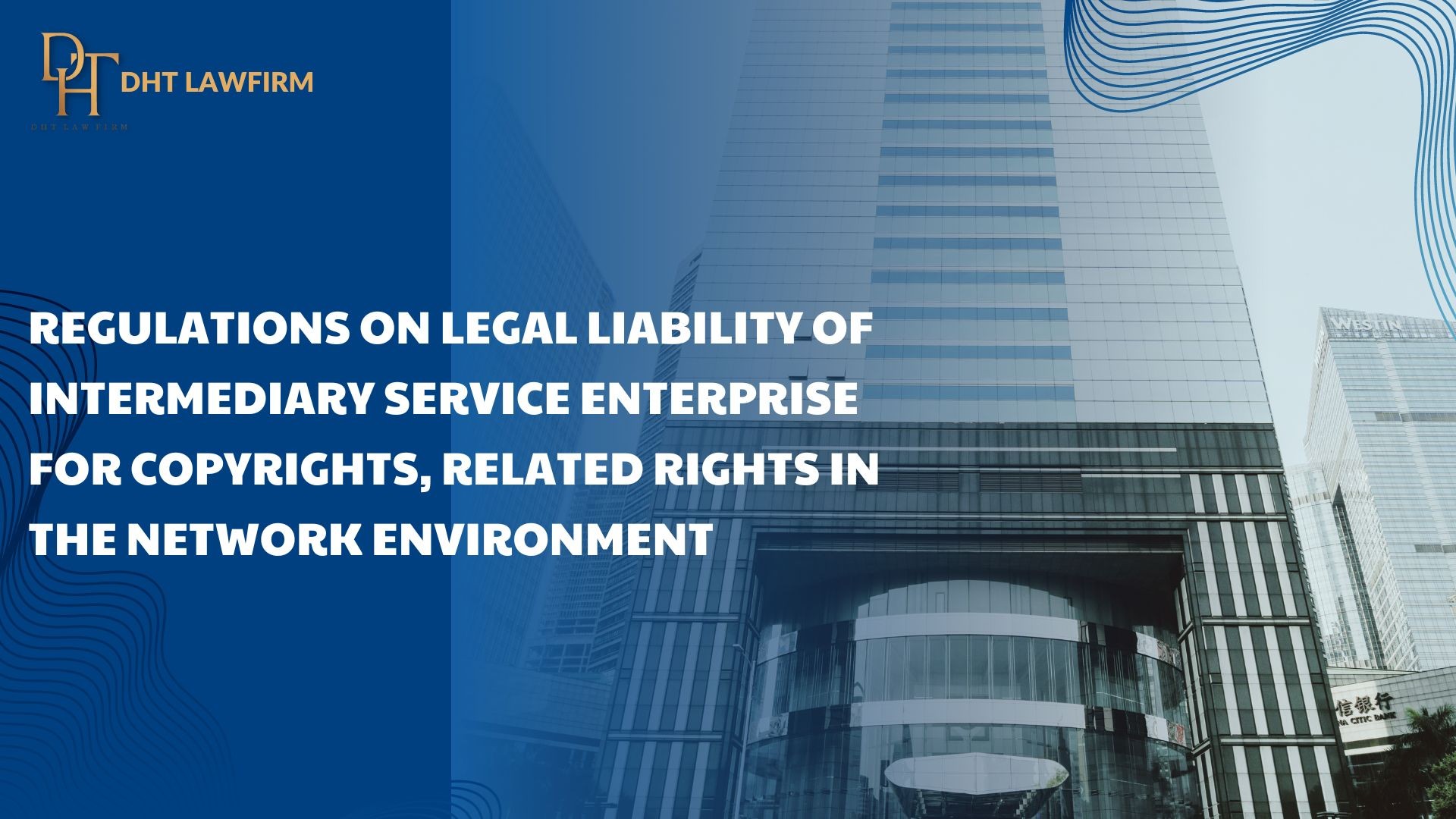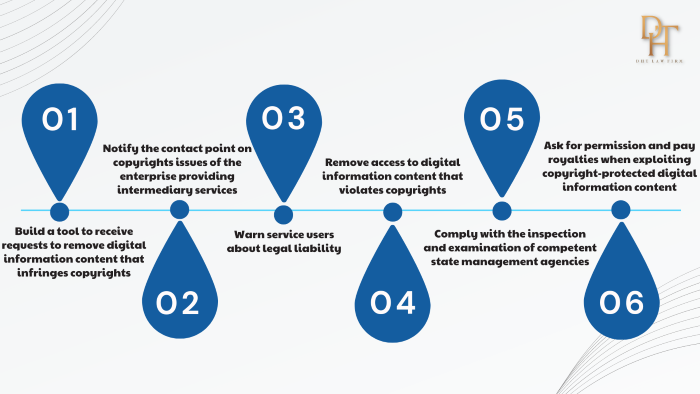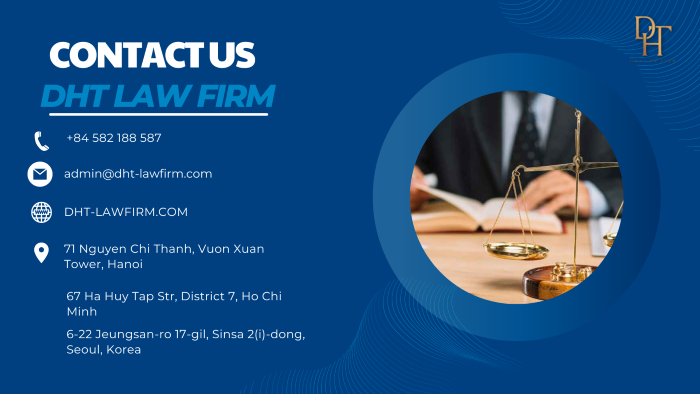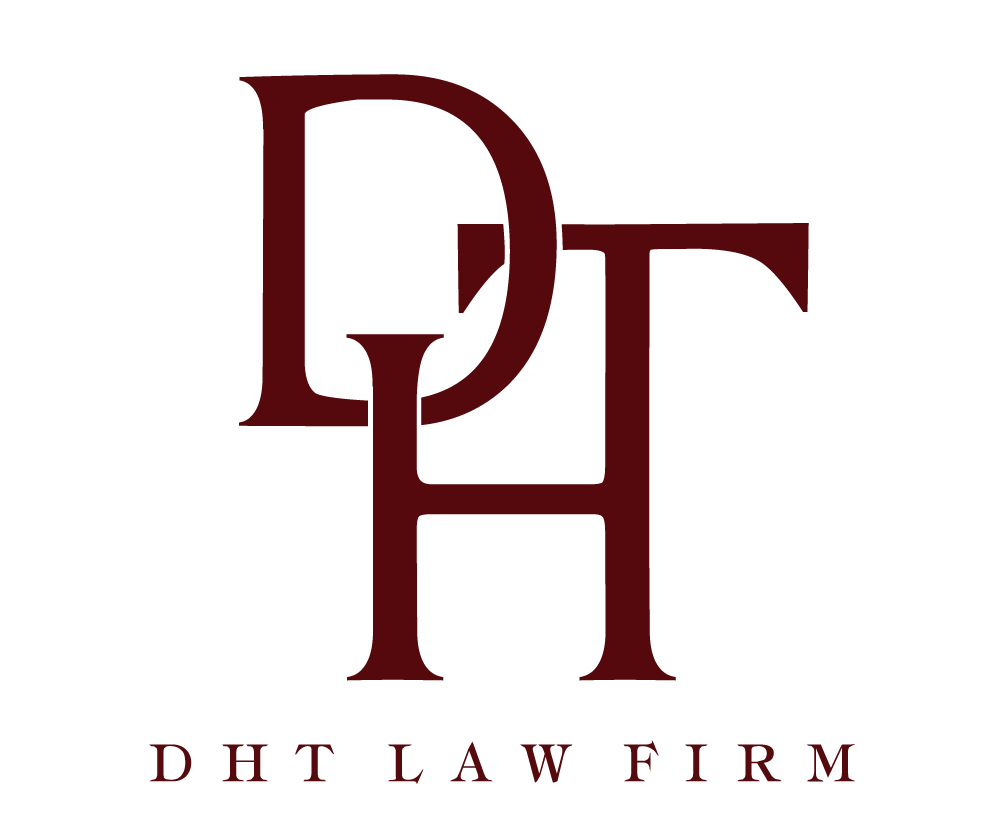
REGULATIONS ON LEGAL LIABILITY OF INTERMEDIARY SERVICE ENTERPRISE FOR COPYRIGHTS, RELATED RIGHTS IN THE NETWORK ENVIRONMENT
The development of technology allows the transmission of works to be expanded like never before. One of the most effective platforms to bring works to the public today is through the Internet. With an electronic device connected to the Internet, users can easily access the object they want from anywhere. Since then, the problem has arisen that someone relies on the Internet to infringe copyrights by exploiting and using illegal works. In addition, when accessing the Internet, there are also third parties who are intermediary service enterprises who have put those works on the network environment. Within the scope of this article, Dai Ha Thanh Law Firm will provide information on “Regulations on legal liability of intermediary service enterprise for copyrights, related rights in the network environment”.
- The concept of an intermediary service enterprise
Pursuant to Clause 1, Article 198b of the Consolidated Document No. 11/VBHN-VPQH of the Law on Intellectual Property stipulates: “Intermediary service providers are enterprises providing technological means for service users to put digital contents on the telecommunications network and the internet; provide online connection for the public to access and use digital contents on the telecommunications network and the internet.”
It can be understood that enterprises providing intermediary services can be domestic or foreign enterprises providing one, several or all types of services as detailed in Clause 1, Article 110 of the Decree. 17/2023/ND-CP. As follows:
1. “Mere conduit” service means a service that transmits digital information provided by service users via telecommunication network and the internet or a service providing access to telecommunication network and the internet;
2. “Caching” service means a service that transmits digital information provided by service users via telecommunication network and the internet that involves automatic, intermediate, and temporary storage of the digital information. The automatic, intermediate, and temporary storage is implemented for the sole purpose of allowing allocation of the digital information to other users at their request to be more effective;
3. “Hosting” service means a service that allows users to store digital information provided by users at their request.
In addition, Clause 2, Article 110 of Decree 17/2023/ND-CP stipulates that enterprises providing intermediary services include:
1. Telecommunication enterprises providing internet access service, internet connection service;
2. Telecommunication enterprises providing line leasing service in case leased lines are not used to provide services in accordance with Point c and Point d of Decree 17/2023/ND-CP;
3. Enterprises leasing server collocation, leasing dedicated server in case servers are not used to provide services in accordance with Point d of Decree 17/2023/ND-CP;
4. Enterprises leasing data storage at request;
5. Enterprises providing online social network services;
6. Enterprises providing digital information search services;
7. Other enterprises provide one, several, or all services similar to those under Clause 1 Article 198b of the Law on Intellectual Property and Clause 1 of Decree 17/2023/ND-CP.
2. Responsibility of intermediary service enterprises for copyrights and related rights in cyberspace
One of the notable contents in Decree 17 is the regulations on enterprises providing intermediary services. For the first time, the responsibility of intermediary service enterprises in the protection of copyrights and related rights in the telecommunications and Internet environment is specified, including the removal or prevention of access to digital information upon receipt of a request from a competent state agency.
2.1. Responsibilities of intermediary service enterprises in the protection of copyrights and related rights in cyberspace

Pursuant to Article 111 of Decree 17/2023/ND-CP, the responsibilities of enterprises providing intermediary services in protecting copyrights and related rights in the telecommunications network and Internet environment are as follows:
Firstly, build a tool to receive requests to remove digital information content that infringes copyrights
Enterprises providing hosting service are responsible for developing mechanisms and tools to receive requests to remove or prevent access to intrusive digital information content that violate copyrights and related rights. The request-receiving tool is one of the following:
- Computer programs that receive requests.
- Websites that receive requests.
- Email addresses that receive requests.
- Web portals that receive requests.
- Other tools with similar functions.
After that, the information provider will receive a message confirming the successful submission of the request and that is the basis for the intermediary service provider to have received the request and will begin to learn, analyze, evaluate the information and then notify the specialized agency in charge of state management of copyrights and related rights of the Ministry of Culture, Sports and Tourism - Copyrights Office of Vietnam.
Second, notify the contact point on copyrights issues of the enterprise providing intermediary services
Enterprises providing intermediary services, after receiving information and notifications about requests to remove or prevent access affecting copyrights and related rights issues, must notify the Copyrights Office - Ministry of Culture, Sports and Tourism and publicize it on its website.
The contact point includes the following information: email address, contact phone number and some other necessary information as prescribed by law.
Third, warn service users about legal liability
Enterprises providing intermediary services are responsible for warning service users about their legal responsibilities if they commit acts of infringing copyrights or related rights and authenticate information when users resign an account.
Note: Businesses need to secure information and user accounts; provide user information when receiving a written request from a competent state management agency to serve verification and handling of violations of law on copyrights and related rights. Businesses do not arbitrarily disclose or publicize any information about the incident or personal information of users who are causing damage or infringing on copyrights or related rights, otherwise they will be subject to responsibility before the law.
Fourth, remove access to digital information content that violates copyrights
Infringement of copyrights and related rights should be stopped as soon as it is detected, especially for streaming activities. Timeliness plays an important role when dealing with illegal acts on the Internet environment, because of its fast and widespread nature.
Enterprises providing intermediary services of "store digital information provided by users at their request" need to remove or prevent access to digital information content when they know that digital information content violates author rights and related rights according to the process specified in Articles 113 and 114 of Decree 17/2023/ND-CP.
Enterprises providing intermediary services when deploying to remove or prevent access to digital information content of intermediary service providers when receiving requests from copyrights and related rights holders according to Points a and b, Clause 1, Article 114 of Decree 17/2023/ND-CP must be responsible for publishing the internal process of handling requests to remove or prevent access to digital information content infringing on copyrights, related rights or request to object to the temporary removal or blocking of access to digital information content on its service system.
Fifth, comply with the inspection and examination of competent state management agencies
Enterprises providing intermediary services must comply with the inspection and examination by competent state management agencies in accordance with the law on copyrights and related rights. All enterprises must comply with the procedures of inspection and examination of the provision of intermediary services in the environment of telecommunications networks and the Internet.
Sixth, ask for permission and pay royalties when exploiting copyrights-protected digital information content
In case an enterprise providing intermediary services exploits and uses digital information content protected by copyrights and related rights posted by its service users on the telecommunications network environment and the Internet for commercial purposes, they must apply for permission and pay royalties according to Clause 2, Article 20, Clause 4, Article 29 and Clause 2, Article 31 of Consolidated Document No. 11/VBHN-VPQH Law on Intellectual Property about the property rights of copyrights, the rights of performers and the rights of broadcasting organizations.
2.2. Legal responsibility of businesses providing intermediary services for acts of infringement of copyrights and related rights
Pursuant to Article 112 of Decree 17/2023/NĐ-CP, legal liabilities of intermediary service providers regarding copyrights, related right infringement are stipulated as follows:
- Intermediary service providers which do not adequately adopt regulations in order to be exempt from legal liabilities in accordance with Clause 3 Article 198b of the Law on Intellectual Property and Article 113, Article 114 hereof must be jointly responsible for incurring damages caused by copyrights, related right infringement caused by people using their services.
- Intermediary services providers that commit copyrights, related right infringement in accordance with Article 28 and Article 35 of the Law on Intellectual Property shall be met with corresponding legal liabilities as per the law.
Moreover, pursuant to Clause 5 Article 5 Joint Circular 07/2012/TTLT-BTTTT-BVHTTDL specifies the responsibility of intermediary service providers for paying damages due to violation of copyrights and related rights as prescribed by law on intellectual property and other related laws in the following cases:
1. Being source to start publishing, transmitting or supplying content of digital information by Internet and telecommunication network without permission of the subject having right;
2. Editing, truncating, copying content of digital information in any manner without permission of the subject having right;
3. Intentionally canceling or disabling technical measures performed by the subject having right for protection of copyrights and related rights;
4. Operation as source of secondary distribution of content of digital information that is obtained due to violation of copyrights and related rights.
Intermediary service enterprises that host or provide services that violate copyrights or related rights, whether they do not fully fulfill their obligations or directly perform them, will have to be jointly responsible. liable to compensate the person who caused the infringement or compensate for damages for his or her own actions. In addition, businesses must also bear other legal responsibilities depending on the level of damage caused to copyrights and related rights according to the provisions of law.
3. Exemption from legal liability for businesses providing intermediary services
The intermediary service providers are not liable for infringement upon copyrights and related rights on the telecommunications network and the internet relevant to the provision or use of their services in the cases specified in Clause 3, Article 198b of Consolidated Document No. 11/VBHN-VPQH Intellectual Property Law. As follows:
1. The intermediary service provider only provides digital contents or access to the digital content;
2. Intermediary service providers may cache during the transmission of information in an automatic and temporary manner to improve efficiency of information transmission, provided information is only changed due to technological reasons; the conditions for access and use of digital contents are complied with; generally accepted industry practice for updating digital contents is adhered to; lawful use of technology according to generally accepted industry practice in order to obtain data about the use of digital contents is not obstructed; the digital content is removed or inaccessible as soon as it is removed at the initial source or access to the digital content has been blocked at the initial source.;
3. Digital contents of service users are archived at their request with the following conditions: it is not to their knowledge that these digital contents infringe copyrights and related rights; actions are promptly taken to remove or block the access to such digital contents knowing that they infringe copyrights and related rights;
4. Other cases prescribed by the Government of Vietnam.
Therefore, in the above cases, businesses providing intermediary services are not legally responsible when damage to copyrights or related rights occurs when providing their services to users on telecommunications network and Internet environment.
Above is the general research of Dai Ha Thanh Law Firm on “Regulations on legal liability of intermediary service enterprise for copyrights, related rights in the network environment”. If you have any questions or issues that need advice, please contact us to receive professional legal advice services.

